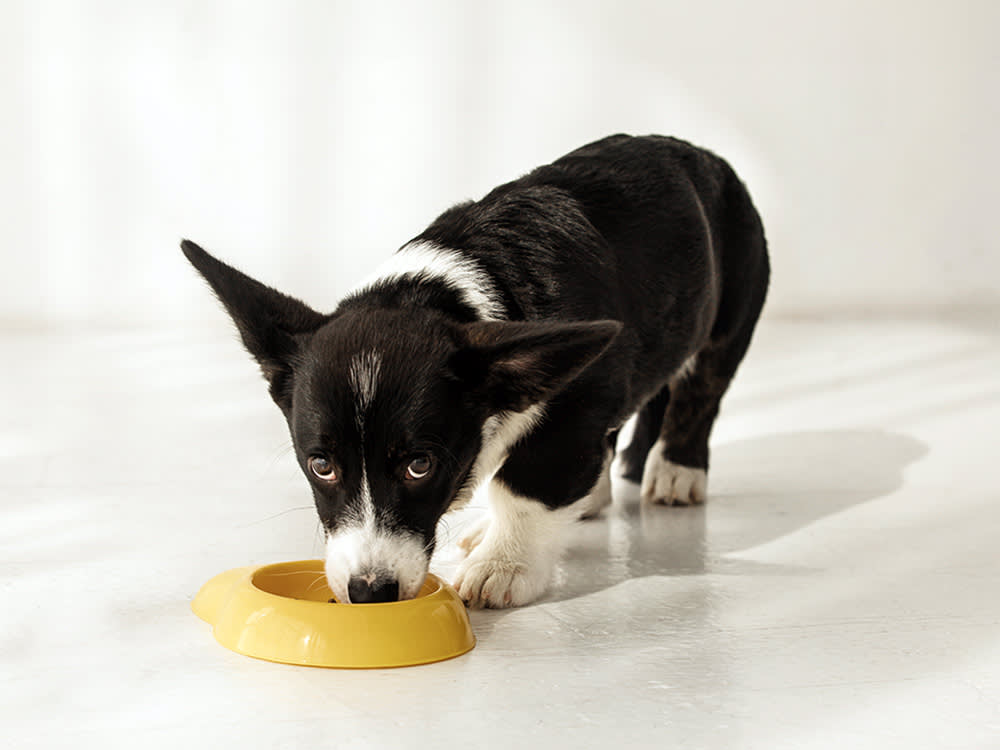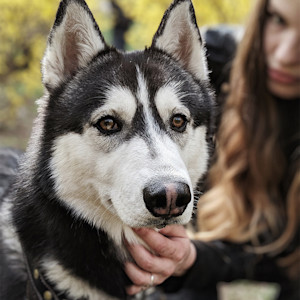Could Your Dog’s Diet Be Changing Their Behaviour?
It turns out the saying ‘you are what you eat’ isn’t just for humans

Share Article
As dog parents, we’re constantly striving to ensure the health and happiness of our furry companions. From regular vet check-ups to daily walks, we do our best to provide a fulfilling life for our pets. But could something as seemingly mundane as their diet be influencing their behaviour?
In recent years, there has been a growing interest in understanding the intricate relationship between a dog’s diet and their behaviour. To find out more about this topic, we’ve consulted with experts in veterinary neurology, animal behaviour and nutrition to unravel the mysteries behind how diet and nutrition impact our canine friends and what they get up to.
Key components of a dog’s diet
Protein, lipids, carbohydrates, vitamins and minerals form the foundation of a balanced diet for dogs. “In a balanced diet, dogs should have all the essential amino acids that their body can’t make itself,” says Dr Wanda McCormick, head of animal and agriculture at Hartpury University. “Any diet with a deficiency could influence hormone and neurotransmitter production, potentially affecting behaviour.”
To understand how diet affects behaviour, it’s essential to examine the key nutrients in a dog’s diet, and how they contribute to your pup’s overall well-being. A complete diet for dogs should be made up of:
Protein: quality protein with essential amino acids is crucial for hormones and the production of neurotransmitters such as serotonin and dopamineopens in new tab, which are associated with mood regulation.
Lipids: fatty acids, particularly omega-3 and omega-6, play a role in brain developmentopens in new tab and influence serotonin and dopamine systems. Plus, fats boost dogs’ energy 2.5 times more than either protein or carbohydrates.
Carbohydrates: high sugar levels can increase activity levels, much like in humans.
Fibre: can help dogs feel full and reduce stereotypic pacingopens in new tab and other ‘food anticipation’ behaviours.
Vitamins and minerals: deficiencies in B vitaminsopens in new tab and magnesium are linked to nervousness and anxiety, which can affect overall behaviour.
The connection between diet and behaviour
According to Dr McCormick, the key components of a dog’s diet play a crucial role in behaviour regulation. “How an animal behaves is influenced by their endocrine (hormone) system and their nervous system, so everything that affects physiology can affect behaviour,” says Dr McCormick.
“Whether it is hormones or neurotransmitters, they are all forms of chemical messages that are made by the body using the chemical building blocks derived from food so low levels of certain nutrients, for example, could lead to low levels of these signals and influence how an animal responds,” she says.
Georgina Harris, European specialist in veterinary neurology and neurosurgery at the University of Cambridge, agrees, shedding light on the link between diet and behaviour in dogs. “Some diets can agree or disagree with a dog just like in humans,” she explains. “A dog that is having a diet that causes stomach issues may behave differently and appear painful, withdrawn or lethargic.”
For instance, low levels of certain nutrients such as tryptophan can affect neurotransmittersopens in new tab, potentially leading to increased aggression or anxiety in dogs. “Often called the ‘happy’ neurotransmitter for the way it can influence ‘mood’ and therefore behaviour, low levels of tryptophan is linked to increased aggression, self-mutilation and anxiety in dogs,” says Dr McCormick.
“Even more obviously, things like sugar levels can affect activity levels and also influence the way an animal behaves,” she says. “There is a lot of interest now in the ‘gut-brain axis’ – the connection between what is going on in the gastrointestinal (GI) tract and how it affects behaviour – and even the ‘microbiota-gut-brain axis’ which also includes the interactions of the bacteria that live within an animal’s GI tract.”
Further influences on behaviour
Dietary considerations can extend beyond mere nutritional intake. There are a number of external factors surrounding mealtimes that influence behaviour, emphasising the broader impact of diet on a dog’s overall well-being.
Method of delivery
Beyond direct links between food and behaviour, Dr McCormick notes the importance of considering the presentation of food to enhance a dog’s mental stimulation and well-being. “For many dogs, mealtime becomes a highlight,” she says. “The way food is presented can influence their overall well-being, with feeding enrichment devices such as food mats spreading out interest and improving their overall mood.”
Additionally, hand feeding your pup can be a fantastic tool for harnessing trust and adapting some less-than-desirable behaviours. For nervous or anxious dogs, it can build your relationship, provide socialisation and help boost their confidence. It can increase motivation for training, and improve impulse control. For pups prone to resource guarding it can improve their relationship with food (and you) with some additional training.
Allergies and sensitivities
Beyond specific nutrients, dietary factors such as food sensitivities or allergies can significantly impact behaviour. “Some dogs will have diet-responsive diseases such as allergic dermatitis,opens in new tab leading to itchiness and affecting their behaviour,” says Dr Harris.
Dr Harris advises always speaking to a vet first before trying a new diet and introducing it slowly. “Some diets will also cause dietary upset such as vomiting or diarrhoea if a dog isn’t used to it or, in more severe cases, they may have a food allergy that can make them feel tired and unwell (as well as giving them vomiting or diarrhoea),” she says.
Dogs may exhibit restlessness or irritability due to GI discomfortopens in new tab caused by sensitivities, so identifying and addressing these issues through dietary adjustments, such as hypoallergenic diets, could also improve overall well-being.
Deficiencies
Dr Harris emphasises the importance of gradual dietary changes and how a lack of certain nutrients can affect behaviouropens in new tab. “Deficiencies in certain B vitamins can cause various manifestations of neurological disease in dogs, particularly thiamine and cobalaminopens in new tab,” she says. “Most commercial dog foods will have sufficient levels of these, but dogs on a home-cooked diet may be at riskopens in new tab if not done very carefully.”
Supplements
Whilst further scientific research is needed to confirm the efficacy of certain supplements on a dog’s behaviour, research from PhD students studying under Dr McCormick have so far seen successful results so far in study on a calming herbal supplement for dogsopens in new tab, too. “We found a reduction in agonistic (fighting) behaviours and increased approaches to strangers in kennelled hounds who had been fed the herbal blend (chamomile, lemon balm, vervain and skullcap),” she says, highlighting the potential of dietary interventions in shaping behaviour.
Elsewhere, levels of fatty acids may be particularly important during brain developmentopens in new tab, and omega-3 and omega-6opens in new tab “could also affect the serotonin and dopamine systems and therefore behaviour”, says Dr McCormick.
Tailored diets
Regarding specific diet-related strategies for anxiety or compulsive behaviours, both experts agree on the potential benefits of tailored diets. “There are specific diets to help seizures in dogs with idiopathic epilepsyopens in new tab and to help dogs with dementiaopens in new tab, for example,” says Dr Harris. “Animals with seizures and dementia will often have anxiety and compulsion symptoms as part of their disease process, so it’s possible diet could help this, too; in particular, a diet high in medium chain triglyceridesopens in new tab that have been shown to be neuroprotective in the brain.”
As pet parents, it’s essential to prioritise a balanced and nutritious diet for our furry friends, whilst consulting with veterinarians and nutrition experts to address any dietary concerns. By understanding the intricate connections between nutrition and behaviour, we can make informed choices to support their overall well-being. So, the next time you fill your dog’s bowl, remember: you’re not just feeding their body but nourishing their mind too.
References:

Orla Pentelow
Orla Pentelow is Kinship UK’s Senior Editor. She has previously written for British Vogue, Bustle, Yahoo and The Telegraph. When not at her desk liking dog videos she’s out and about with her rescue pup, Luna, who works primarily as chief distractor.
Related articles
![woman petting a husky on the chin]()
The Debate on Canine Domestication
Your dog’s origin story
Can Dogs Eat Onions?
Add them to the list of no-nos in the kitchen...
![Young blonde woman with a Jack Russell puppy during spring in the city.]()
Dog Training Treats They Will Sit, Stay – You Name It – For
A behaviourist reveals the most mouth-watering treats for training your pup
![Dog standing next to dog food spilling out of a container]()
7 Dog Food Containers You Didn’t Know You Needed
Because your dog is plotting how to break into their stash
![Dog Sitting In A Field]()
8 Superseeds to Add to Your Dog’s Diet
From chia to pumpkin, seeds pack a major nutritional punch








